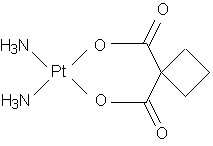Definition
Carboplatin is a chemotherapeutic agent used to treat cancer by interfering with the growth of cancer cells. Carboplatin is marketed under the brand name Paraplatin; it may also be referred to as CBDCA, JM-8, or carboplatinum.
Purpose
Carboplatin is approved by the Food and Drug Administration (FDA) to treat ovarian cancer. It has also been useful for other types of cancer including head and neck cancer, cervical cancer, lung cancer, endometrial cancer, testicular cancer, and brain tumors.
Description
Carboplatin is a member of the group of chemotherapy drugs known as heavy metal-like alkylating agents. Alkylating agents interfere with the genetic material (deoxyribonucleic acid, or DNA) inside the cancer cells and prevent them from further dividing and growing more cancer cells.
Recommended dosage
The dose of carboplatin can be calculated using several methods. A carboplatin dose can be determined using a mathematical calculation that measures a person's body surface area (BSA). This number is dependent upon a patient's height and weight: the larger the person, the greater the body surface area. BSA is measured by the square meter (m2). The body surface area is calculated and then multiplied by the drug dosage in milligrams per square meter (mg/m2). This calculates the actual dose a patient is to receive.
A common dosage of carboplatin alone for the treatment of patients with recurrent ovarian cancer is 360 mg/m2 given on day one into a vein every four weeks. When given in combination with the chemotherapeutic agent cyclophosphamide for the treatment of recurrent ovarian cancer, a dose of 300 mg/m2 administered intravenously is typical. This combination is repeated every four weeks for six cycles.
The second way to determine the dose of carboplatin is for the physician to measure or estimate how well the patient's kidneys work. The patient may be asked to collect all of their urine in a bottle for a 24-hour period. The sample will then be sent to a laboratory and analyzed. A mathematical calculation is performed to determine how well the patient's kidneys are working and subsequently to determine the carboplatin dose.
Precautions
Blood counts will be monitored regularly while on carboplatin therapy. During a certain time period after receiving carboplatin there is an increased risk of getting infections. Caution should be taken to avoid unnecessary exposure to infectious agents. Patients should also check with their doctors before receiving live virus vaccines while on chemotherapy.
Patients who may be pregnant or trying to become pregnant should talk to their doctor before receiving carboplatin. Men and women undergoing chemotherapy are at risk of becoming sterile.
Patients with known previous allergic reactions to chemotherapy drugs should notify their doctors.
Side effects
Nausea and vomiting are among the most common side effects from receiving carboplatin. Nausea and vomiting can begin up to six hours after treatment and can last as long as 24 hours. Patients are given medicines known as antiemetics before receiving carboplatin to help prevent or decrease this side effect. Diarrhea, loss of appetite, constipation, pain, and weakness have also been reported to occur.
Myelosuppression, or a suppression of bone marrow activity resulting in a low blood cell count, is expected to occur following carboplatin administration. When a patient's white blood cell count drops below normal (leukopenia), there is an increased risk of developing a fever and infections. Neupogen, a drug used to increase the white blood cell count, may be administered.
A decrease in platelet count is most notable following carboplatin administration. Platelets are blood cells that aid for the formation of clots. When the platelet count becomes abnormally low, patients are at an increased risk for bruising and bleeding. If the platelet count remains too low a platelet blood transfusion is an option. Low red blood cell counts (anemia) may also occur following many cycles of carboplatin administration; during the first cycles this is usually not a common problem. Low red blood cell counts may result in dizziness and fatigue and can be treated with the drug erythropoietin.
A less common side effect of carboplatin is damage to nerves and nervous system tissues. Patients may feel tingling and numbness of the fingers and toes. This side effect is more common in patients over 65 years of age or those who have previously received the chemotherapy drug cisplatin. Other less common side effects include rash, itching, hair loss (alopecia), mouth sores, hearing problems, kidney problems, liver problems, vision problems, swelling, redness and pain at the site of injection, allergic reactions, heart problems, and breathing problems.
Carboplatin has caused allergic reactions. The symptoms of an allergic reaction include difficulty breathing, drop in blood pressure, rash, itching, sweating, redness of the face, dizziness, and increased heart rate. These symptoms occur within minutes of administering the drug and appear to be more common in patients previously treated with platinum medicines.
Carboplatin may cause the body to waste certain normal electrolytes that circulate in the body. Low levels of magnesium, calcium, phosphate, or sodium can be found in patients who have received carboplatin. These rarely cause difficulties and are monitored by the doctor.
Interactions
Patients should avoid other drugs that may cause damage to the kidneys or hearing.
KEY TERMS
- Anemia
- An abnormally low red blood cell count.
- Chemotherapy
- Specific drugs used to treat cancer.
- DNA
- Deoxyribonucleic acid; the genetic material inside of cells.
- Electrolytes
- Natural salt substances in the body that move in and out of cells to maintain cell function.
- Food and Drug Administration
- A government agency that oversees public safety in relation to drugs and medical devices. The FDA gives the approval to pharmaceutical companies for commercial marketing of their products.
- Intravenous
- Entering the body through a vein.
- Leukopenia
- An abnormally low white blood cell count.
- Metastatic
- Cancer that has spread to one or more parts of the body.



